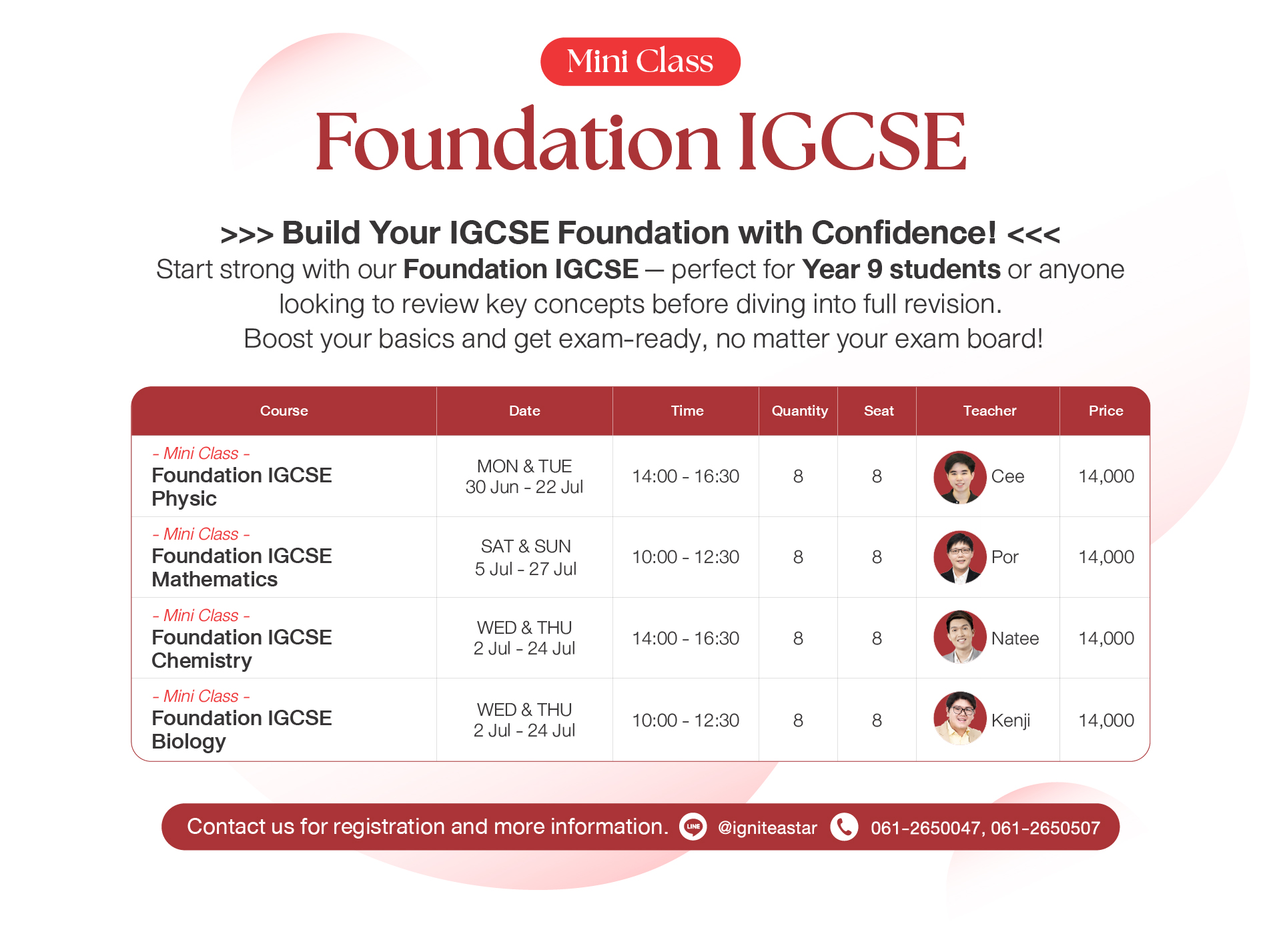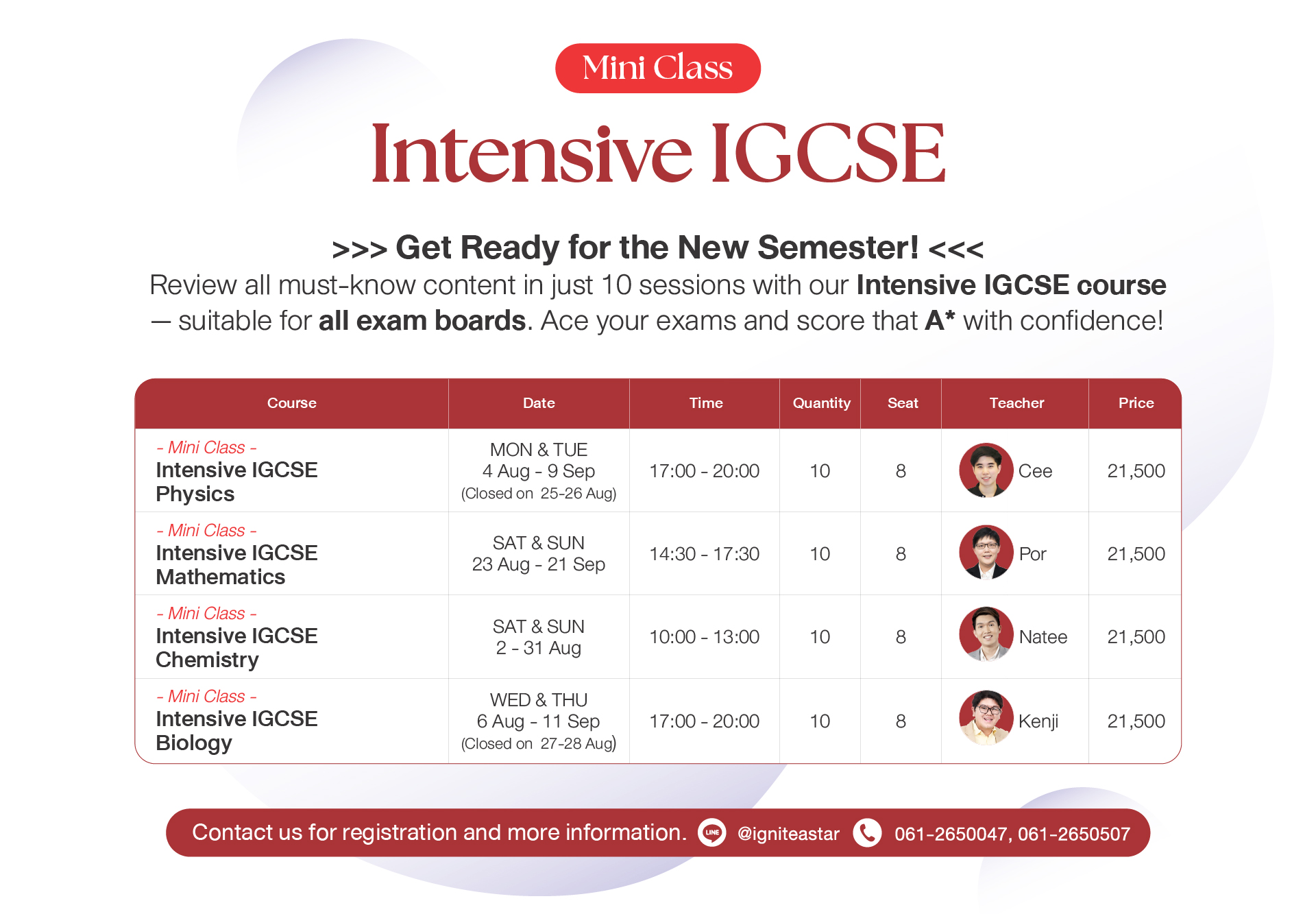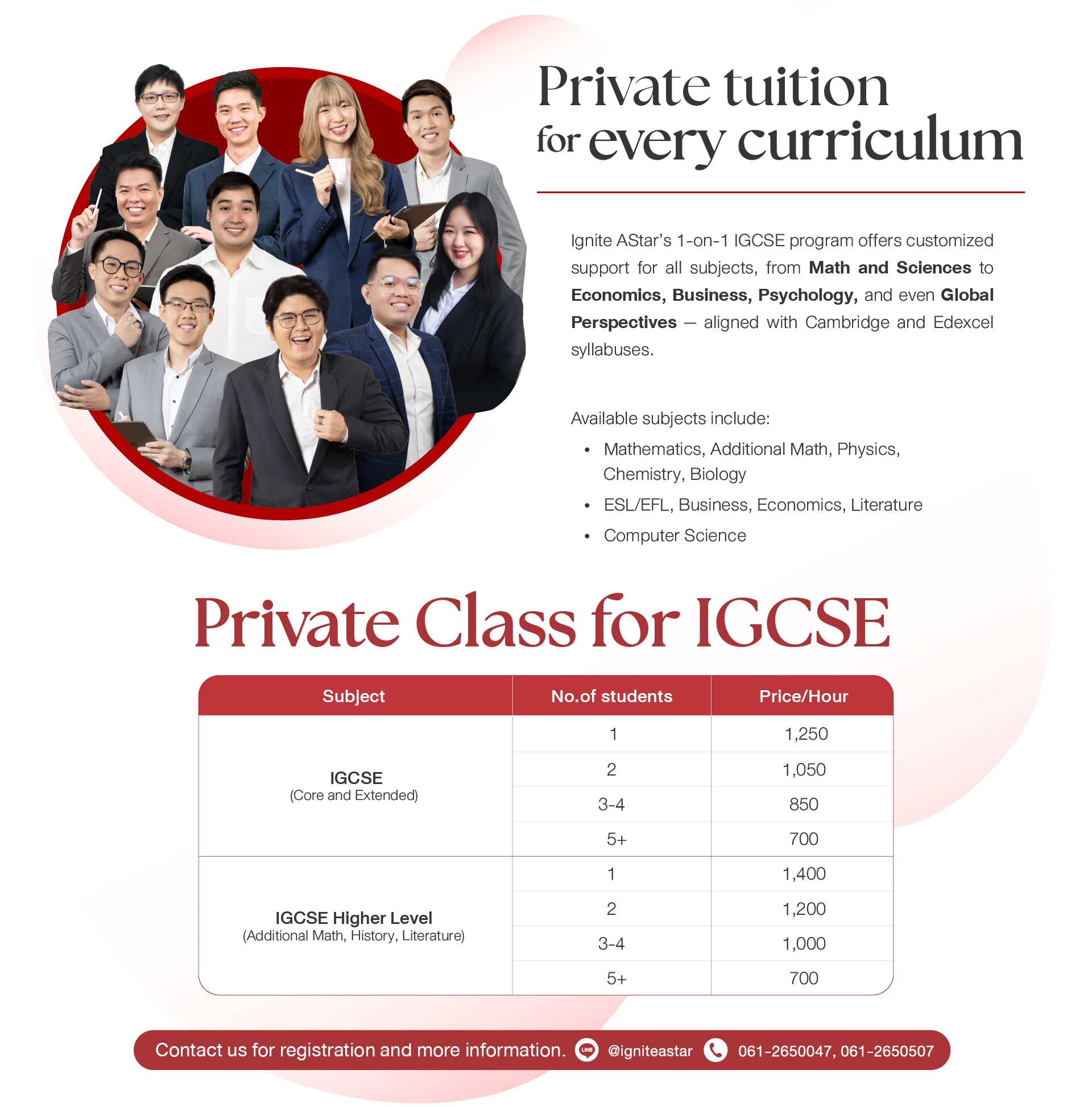IGCSE is an internationally recognized qualification for students aged 14–16 (Year 10–11). It serves as a strong foundation for further studies such as A-Level, IB, or international university admissions.

IGCSE Exam Success Starts at Ignite A*
Ignite A Star provides expert-led IGCSE courses across Mathematics, Sciences, English, Economics, Business, and Computer Science. With tailored support for both Cambridge and Edexcel exam boards, students receive exam-focused guidance and personalized learning to achieve top IGCSE results.
Choose Course Format

IGCSE Mini Class
Small group learning for personalized support and exam success.
Mini Classes at Ignite AStar are designed for students who want to master IGCSE core subjects through focused, high-impact lessons. With options like Foundation, Intensive, and Marathon courses, students can strengthen their understanding, boost exam readiness, and stay ahead.
Subjects available:
- Foundation: Physics, Chemistry, Biology, Mathematics
- Intensive: Physics, Chemistry, Biology, Mathematics
- Marathon: (CIE & Edexcel): Physics, Chemistry, Biology, Mathematics


IGCSE Online Courses
Ignite A* offers premium IGCSE online courses with tailored learning and expert guidance, helping students across CIE and Edexcel syllabuses build a strong foundation, master content, and sharpen problem-solving — anytime, anywhere with 24/7 access.

IGCSE Private 1on1
Students can choose to study one-on-one with a top-profile tutor or form their own small private group. With full flexibility, you can select the subjects, schedule, and learning style that best fits your needs.

FAQ
What is IGCSE and how is it different from regular high school programs?
IGCSE (International General Certificate of Secondary Education) is a globally recognized curriculum developed by Cambridge and Edexcel. It emphasizes critical thinking, academic rigor, and subject flexibility—preparing students for A-Level, IB, or international university admission.
IGCSE คืออะไร?
IGCSE (International General Certificate of Secondary Educational) คือ การสอบของประเทศอังกฤษที่ทำให้ได้รับวุฒิการศึกษาเทียบเท่า ม.4 ในประเทศไทย โดยใช้เวลาเรียนทั้งหมด 2 ปี (Year 10-11) ซึ่งหากเรียนจบหลักสูตร IGCSE แล้ว สามารถไปศึกษาต่อในระดับที่สูงขึ้นได้ อาทิ นำไปใช้ศึกษาต่อในหลักสูตร AS, A Level, IB หรือเพื่อศึกษาต่อระดับมหาวิทยาลัย
*หมายเหตุ นักเรียนที่สอบ IGCSE ตั้งแต่ปี 2560 เป็นต้นไป จะต้องสอบ AS/ A-Level อีก 3 วิชาด้วยจึงจะนำผลไปเทียบวุฒิระดับ ม.6 ได้
Who should take IGCSE courses?
IGCSE is ideal for students aged 14-16 (Year 10-11) aiming to build a strong academic profile for international university applications or A-Level/IB study.
หลักสูตร IGCSE เหมาะสำหรับนักเรียนอายุ 14–16 ปี (Year 10–11) ที่ต้องการสร้างพื้นฐานทางวิชาการที่แข็งแกร่ง เพื่อเตรียมความพร้อมสำหรับการสมัครเรียนต่อในมหาวิทยาลัยระดับนานาชาติ หรือการเรียนต่อในระดับ A-Level / IB
How long does it take to prepare for the IGCSE exams?
Most students prepare over 1.5 to 2 years, but with our Intensive IGCSE course, we cover everything students learn over 2 school years in just 30 hours, focusing on helping students succeed in the IGCSE exam.
นักเรียนส่วนใหญ่ใช้เวลาเตรียมตัวประมาณ 1.5 ถึง 2 ปี แต่ด้วยหลักสูตร Intensive IGCSE ของเรา นักเรียนจะสามารถเรียนรู้เนื้อหาครบถ้วนเทียบเท่าที่เรียนในโรงเรียนตลอด 2 ปี ภายในเวลาเพียง 30 ชั่วโมง โดยมุ่งเน้นการเตรียมความพร้อมเพื่อความสำเร็จในการสอบ IGCSE อย่างมีประสิทธิภาพ
Which exam boards do we support—Cambridge or Edexcel?
We support both Cambridge (CIE) and Edexcel syllabuses. Our expert tutors are familiar with the differences and tailor their teaching to your specific exam board.
เราเปิดสอนทั้งหลักสูตร Cambridge (CIE) และ Edexcel โดยทีมติวเตอร์ผู้เชี่ยวชาญที่เข้าใจความแตกต่างของแต่ละหลักสูตร และออกแบบการสอนให้เหมาะสมกับข้อสอบและความต้องการของนักเรียนในแต่ละระบบอย่างเฉพาะเจาะจง
When are the IGCSE exams held?
IGCSE exams are held twice a year:
- May/June (main session)
- October/November (alternative session or retakes)
การสอบ IGCSE จัดขึ้นปีละ 2 ครั้ง ได้แก่
รอบเดือนพฤษภาคม/มิถุนายน (รอบหลัก)
และรอบเดือนตุลาคม/พฤศจิกายน (รอบทางเลือกหรือรอบสอบซ่อม)
What’s the difference between the May/June and Oct/Nov IGCSE exam sessions?
Both sessions offer the same syllabus, difficulty level, and international recognition. The main difference is:
- May/June is the main session, with results released in August—perfect for aligning with international school calendars or university deadlines.
- Oct/Nov is an alternative session, often used for retakes or by students who need more preparation time.
How many levels are there in the IGCSE?
There are two levels:
Core covers only the basic, foundational content of each subject. The exam is shorter and has fewer questions compared to the Extended level. Grades awarded range from C, D, E, F, to G. However, achieving only a C at the Core level is usually not sufficient for progressing to A-Level studies.
Extended includes more advanced and in-depth content, requiring more intensive study. Students can achieve the full range of grades, from A* (highest), A, B, C, D, down to E.
For example, if a student takes 9 IGCSE subjects but scores a D in one, even if they achieve C or above in the other subjects, it is considered that they have officially completed only 8 IGCSE subjects. The IGCSE results are used as a benchmark to assess whether a student has sufficient knowledge to progress to A-Level in that subject. Some schools may require at least a B, while highly competitive schools might only accept an A for A-Level entry.
Therefore, Ignite strongly recommends that students choose the Extended level over the Core level to maximize their chances of achieving higher grades such as A*, A, or B. Scoring only a C, especially at the Core level, can limit subject choices at A-Level and may weaken the academic record, as some schools or universities may view it as an indication that the student has not sufficiently mastered the subject.
- Core (พื้นฐาน) จะครอบคลุมเฉพาะเนื้อหาพื้นฐานเบื้องต้นของวิชานั้นๆใช้เวลาน้อยกว่าและจำนวนข้อน้อยกว่าระดับ Extended
เกรดที่จะได้ ได้แก่ C,D,E,F,G (การได้แค่เกรด C จะนั้นไม่เพียงพอที่จะเรียนต่อ A- Level) - Extended (ขั้นสูง) ข้อสอบจะมีเนื้อหาขั้นสูงที่ต้องเรียนเข้มข้นกว่าของวิชานั้นๆ ซึ่งผู้เข้าสอบสามารถมีสิทธิได้คะแนนสูงสุดคือ A*แล้วไล่ไป A,B,C,D,E ตามลำดับ
หากนักเรียนเลือกเรียน IGCSE 9 วิชา แต่ผลสอบปรากฏว่ามี 1 วิชาได้ D ถึงวิชาที่เหลือจะได้ C ขึ้นไป จะสรุปว่านักเรียนเรียนจบ IGCSE แค่เพียง 8 วิชาเท่านั้น ซึ่งคะแนน IGCSE นั้นจะเป็นตัววัดว่านักเรียนมีความรู้มากพอที่จะต่อ A-Level ในวิชานั้นหรือไม่ ซึ่งบางโรงเรียนอาจจะตัดเกณฑ์ที่ B หรือบางโรงเรียนที่มาตรฐานค่อนข้างสูงมากอาจจะบังคับว่าต้องได้ A เท่านั้นถึงจะอนุญาติให้เรียนต่อ
ดังนั้นทาง Ignite แนะนำให้น้องๆ เลือกเรียนเป็น Extended มากกว่า Core เพื่อเพิ่มโอกาสในการได้ A* A B เพราะหากได้เพียงแค่ C อาจจะทำให้ตัดโอกาสในการเลือกวิชา A-Level และจะทำให้ record คะแนนของเรานั้นอาจจะดูไม่ดีนักหากได้แค่ C ใน วิชา Core บางโรงเรียนหรือมหาวิทยาลัยอาจจะมองว่าเรานั้นศึกษาวิชานั้นไม่แน่นพอ
How Examiner Grading Works?
The grading for IGCSE and A-Level is not determined by a fixed percentage cutoff (e.g., 80% = A, 70% = B). Instead, final grades are calculated based on three key factors:
1️⃣ The raw score the student achieves on the exam
2️⃣ How the student’s score compares to others sitting the same exam session
3️⃣ The difficulty standard of that year’s exam paper
This means that in some years, a raw score of 75% might be enough to earn an A*, while in other years, even a 90% score might only result in an A — depending on how challenging the exam was and how all candidates performed.
การตัดเกรดของ IGCSE กับ A- Level นั้น ไม่ได้ตัดคะแนนว่าถ้าได้ 80% จะได้ A ได้ หรือ 70% ขึ้นไปจะ ได้ B แต่การคิดเกรดนั้นจะมาจาก 3 ปัจจัย
1️⃣คะแนนดิบที่นักเรียนสอบได้
2️⃣คะแนนที่ได้เมื่อเทียบกับคนอื่นๆ ในรอบสอบ
3️⃣ มาตรฐานความยากของข้อสอบปีนั้น
แปลว่าหากบางปี คะแนนดิบ 75% ก็อาจจะได้ A* แต่บางปีถึงทำได้ถึง 90% อาจะได้แค่ A
How Many Subjects Are There in IGCSE?
IGCSE offers around 77 subjects across six groups:
Creative & Professional (e.g., Accounting, Art, Drama)
English Language & Literature
Humanities & Social Sciences (e.g., Economics, Geography)
Languages (e.g., Thai, English, Chinese, French)
Mathematics (Math, Additional Math)
Sciences (Biology, Chemistry, Physics)
Each school offers a different selection, and you don’t need to attend an international school to take the exams.
Students typically take 7–11 subjects, combining required subjects (like Math, English, Science) and electives. Choosing a broad mix helps students explore interests and prepare for future A-Level and university choices.
⚠️ Important: Some A-Level subjects require a foundation from IGCSE — for example, aspiring medical or engineering students should take Biology, Chemistry, and Physics early to avoid missing out later.
IGCSE มีทั้งหมดกี่วิชา?
IGCSE มีประมาณ 77 วิชา แบ่งเป็น 6 กลุ่มหลัก:
กลุ่มสร้างสรรค์และวิชาชีพ (เช่น การบัญชี ศิลปะ การละคร)
ภาษาอังกฤษและวรรณคดี
มนุษยศาสตร์และสังคมศาสตร์ (เช่น เศรษฐศาสตร์ ภูมิศาสตร์)
ภาษา (เช่น ไทย อังกฤษ จีน ฝรั่งเศส)
คณิตศาสตร์
วิทยาศาสตร์ (ชีววิทยา เคมี ฟิสิกส์)
แต่ละโรงเรียนเปิดสอนไม่เหมือนกัน และไม่จำเป็นต้องเรียนโรงเรียนนานาชาติเพื่อสอบได้
นักเรียนมักเลือกเรียน 7–11 วิชา รวมวิชาบังคับ (เช่น คณิต อังกฤษ วิทย์) และวิชาเลือก เพื่อเปิดโอกาสสำรวจความถนัดและวางแผนเรียนต่อ A-Level หรือมหาวิทยาลัย
⚠️ สำคัญ: บางวิชา A-Level ต้องมีพื้นฐานจาก IGCSE เช่น แพทย์หรือวิศวะ ควรเรียน ชีวะ ฟิสิกส์ เคมี ไว้ตั้งแต่ต้นเพื่อไม่พลาดโอกาสต่อยอดในอนาคต
How much is the IGCSE exam fee in 2025?
IGCSE exam fees with the British Council are approximately 6,035–9,430 THB per subject (varies by subject). Late registration will incur extra charges.
📅 May/June 2025 session
Regular entry: 26 Dec 2024 – 14 Feb 2025
Late entry: 15 Feb – 10 Apr 2025
Check the latest details on the official British Council Thailand website.
ค่าธรรมเนียมสอบ IGCSE กับ British Council อยู่ที่ประมาณ 6,035–9,430 บาท/วิชา (ขึ้นอยู่กับวิชา) และถ้าลงทะเบียนล่าช้า จะมีค่าปรับเพิ่ม
📅 รอบ May/June 2025
ลงทะเบียนปกติ: 26 ธ.ค. 67 – 14 ก.พ. 68
ลงทะเบียนล่าช้า: 15 ก.พ. – 10 เม.ย. 68
ควรเช็กอัปเดตราคาและรายละเอียดล่าสุดกับเว็บไซต์ British Council Thailand
Where can I register for the IGCSE exams?
✅ Students at British-system international schools (e.g., Harrow, Shrewsbury, Bangkok Patana) register through their school
✅ Private candidates can register via British Council
✅ Harrow International School also allows external students to sit exams there
✅ นักเรียนโรงเรียนนานาชาติระบบอังกฤษ (เช่น Harrow, Shrewsbury, Bangkok Patana) สมัครสอบผ่านโรงเรียนของตนเอง
✅ นักเรียนทั่วไปสามารถสมัครสอบผ่าน British Council
✅ Harrow International School เปิดรับนักเรียนภายนอกเข้าสอบด้วย

